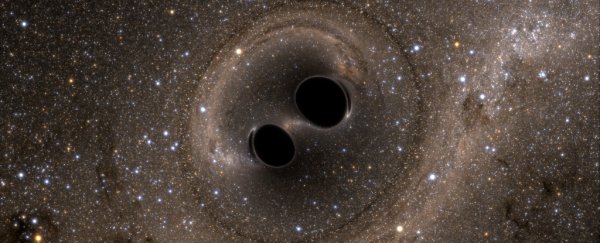In 1935, Albert Einstein and Nathan Rosen hypothesised the existence of wormholes - a sort of "bridge" connecting two regions of space, due to extreme gravitational warping of spacetime.
The concept is theoretical, and wormholes are yet to be detected. But according to a new paper, those gravitational waves we've detected from colliding black holes? Maybe it was colliding wormholes instead.
They could also have been caused by other exotic compact objects (ECOs), too, such as fuzzballs or gravastars - theoretical objects that are alternatives to black holes. And a pair of researchers say that a difference in the signal caused by a black hole collision and the signal caused by an ECO collision could help determine what really happened.
"The final part of the gravitational signal detected by these two detectors - what is known as ringdown - corresponds to the last stage of the collision of two black holes, and has the property of completely extinguishing after a short period of time due to the presence of the event horizon," said theoretical physicists Pablo Bueno and Pablo Cano of KU Leuven University in Belgium.
"However, if there were no horizon, those oscillations would not disappear completely; instead, after a certain time, they would produce a series of 'echoes', similarly to what happens with the sound in a well. Interestingly, if instead of black holes, we had an ECO, the ringdown could be similar, so we need to determine the presence or absence of the echoes to distinguish the two types of objects."
These echoes may have existed, but simply went unnoticed because of a lack of theoretical models to compare them to. This is what the research team has created: a model based around wormholes that rotate, like a type of black hole called a Kerr black hole.
"Wormholes do not have an event horizon, but act as a space-time shortcut that can be traversed, a kind of very long throat that takes us to another universe," Bueno said. "And the fact that they also have rotation changes the gravitational waves they produce."
If these were responsible for the gravitational wave signal, they'd call into question the existence of the black holes thought to be responsible for the LIGO gravitational wave signals.
That wouldn't be to say that there is no such thing as a black hole - they could still exist on other scales, such as the supermassive. But if something else were causing the LIGO signal, it would have a strong impact on black hole hypothesis.
So far, however, the team's results have been inconclusive. The graphs from the rotating wormhole model don't really differ much from what has been obtained so far, with the obvious exception of the echoes present in the model.
This means the signal that would prove the team's hypothesis has not yet been detected - although that could change with time, the researchers believe.
"The confirmation of echoes in the LIGO or Virgo signals would be a practically irrefutable proof that astrophysical black holes don't exist," Bueno said.
"Time will tell if these echoes exist or not. If the result were positive, it would be one of the greatest discoveries in the history of physics."
It would indeed - but the body of evidence for the existence of black holes, and the lack of it for the existence of wormholes puts a dent in this whole idea, according to theoretical physicist Susan Scott from the Australian National University.
"It is very unlikely that wormholes actually exist. There is a plethora of evidence to support the existence of black holes and a well known process to produce them through the collapse of massive stars," Scott, who did not participate in this study, explained to ScienceAlert.
"Wormholes, on the other hand, really live in the realm of science fiction with no known method to actually produce them. Even if they could somehow be produced, their postulated extreme instability would make their appearance very short-lived.
"So the reality is that the authors' hypothesis that the LIGO gravitational wave detections could have been made by collisions between rotating wormholes is extremely unlikely."
According to Scott, it's taken general relativity theorists decades to conclude that wormholes are unlikely to actually exist.
"So it would be fair to say that their possible existence has been of great interest to us," she told ScienceAlert.
"Although it is highly unlikely that the LIGO detections have resulted from the collision of rotating wormholes, it would be satisfying, in the future, to rule out this possibility."
The discovery of gravitational waves from LIGO was a surprise, and it's probable that with increased sensitivity of upcoming instruments, many more surprises await. But maybe don't hold your breath for wormholes.
"The detection of wormholes would create a major upheaval for gravitational wave astronomy and astronomy as a whole, but we have no reason or evidence to prepare for this any time soon," says Scott.
What the paper does do is prepare the groundwork for future research; not necessarily to confirm the existence of wormholes, perhaps, but to bolster our knowledge about black holes.
The paper has been published in Physical Review D.
